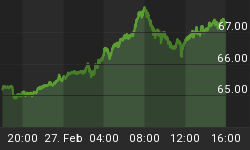About three weeks ago, China's top political leaders met in Beijing and announced the country's new GDP goal for 2022: around 5.5%, the lowest target in decades. That appears perfectly excusable; after all, after two years of grappling with the coronavirus pandemic, Beijing is also dealing with rising debt, turmoil in real estate markets, and bankruptcies of large developers, as well as continuing trade tensions with the United States.
But China's economy could be in even more trouble thanks to the Ukraine crisis--and Beijing's coziness to Moscow.
According to the Institute of International Finance, investors have been pulling money out of China on a huge scale even as flows to other emerging markets have been holding up. Indeed, a report by the Institute of International Finance (IIF) says global investors have been withdrawing money out of China on an "unprecedented" scale since Russia invaded Ukraine in late February, with the yuan likely to face more pressure in the coming months.
This is to be expected, considering that China's trade ties with Russia and Ukraine are valued at $147 billion and $19 billion, respectively.
Capital flight
Data by China Central Depository & Clearing, a depository for government bonds, reveals that overseas investors' holdings of Chinese onshore bonds fell by 67 billion yuan (US$10.5 billion) in the month of February, with Macquarie Capital projecting that March outflows will be even bigger. The first 21 days of March has seen China record net outflows of 59 billion yuan through the northbound Stock Connect programme with Hong Kong, putting it on a nearly 90 billion yuan monthly run rate and significantly higher than the 70 billion yuan of fund outflows recorded in March 2020.
Based on data from the Taiwan Stock Exchange, South China Morning Post (SCMP) estimates that foreign investors have sold NT$450.2 billion (US$15.7 billion) worth of stocks in the four weeks since the start of the war on February 20, almost equal to the total equity sales by foreign investors for the entire 2021.
Credit demand has also been weakening, with lending in February falling to 1.23 trillion yuan (US$193.2 billion), down sharply from a record 3.98 trillion yuan in January.
So, why is the world fleeing from China?
First off, the war has renewed fears in Taiwan of increasing risks of military aggression from the Chinese mainland, which views the East Asian island as a breakaway province to be reunited—by force if necessary.
Second, China has lately been deepening ties with Russia, which could jeopardize its own economy if it acts as a buffer against sanctions by the U.S. and the West. China-Russia relations have historically been marked by mutual wariness, including a border conflict in the 1960s that reportedly pushed the two countries to the brink of nuclear war. But the two have been cozying up ever since Western sanctions on Russia over its annexation of Crimea in 2014.
And third, a hawkish Fed has been weighing on multiple stock markets across the globe, and Taiwan's has not been an exception.
The Ukraine crisis--and China's apparent condoning of Putin's actions--may end up galvanizing the U.S. political establishment and the United States' allies in a way that foreign policy debate ends up impacting China negatively.
Hopefully, China will be able to retain its position as the pre-eminent EM economy. After all, Beijing's relatively strong currency allows it to handle near-term volatility that would affect trade. Beijing has allowed the yuan to remain strong (currently around 6.3 to the U.S. dollar), but if necessary, it could pump a lot of cash into the economy and supercharge exports by pushing the yuan lower. Beijing has also shifted its rhetoric over the past few weeks, from embracing Putin and a friendship without limits to advocating for "respecting and safeguarding the sovereignty and territorial integrity of all countries."
















